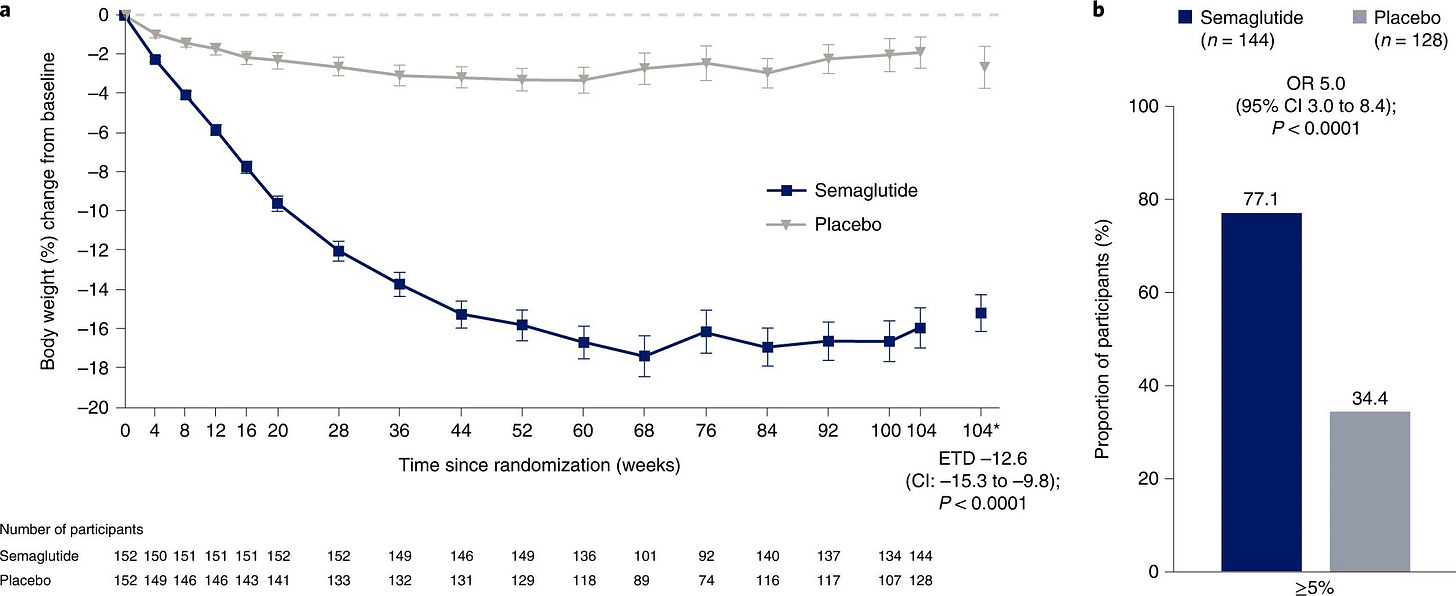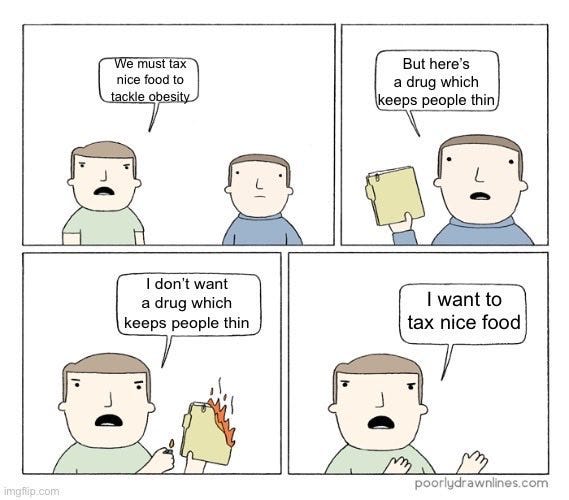The Other Jab to Freedom
Or how one weird trick could save billions in cash, thousands of lives, and most importantly let me buy sweets in peace
Have you noticed how supermarkets have got… worse? More irritating? Particularly the smaller ones. Sainsbury’s Local, Tesco Express, Little Waitrose and the rest of them. The layouts have all mysteriously changed. Gone are end of aisle confectionaries. Replaced - in my little local supermarket at least - with buckets, mops, and toilet cleaner.
Another I have recently visited simply keeps the end of aisle bit completely clear. This is not by coincidence, it’s by design.
The Government’s obesity strategy railed against sugary food placed at “store entrances, checkouts, and aisle ends”, claiming on the basis of one study into soft drinks that “end-of-aisle displays have been shown to increase soft drink sales by just over 50%”. The state therefore set out to micromanage British supermarket layouts. To ‘nudge’ us into eating less.
This was the same obesity strategy that demanded an end to ‘Buy One Get One Free’ offers. The document, produced in the summer of 2020 following Boris Johnson’s brush with Covid and subsequent personal desire to lose weight, promised to introduce “mandatory legislation we will ensure a level playing field for everyone selling groceries”.
Whilst the BOGOF ban has been kicked into the long grass thanks to Liz Truss, the strategy’s other nannying mandates have been introduced. From October, the government has banned products described as high in fat, sugar, and salt (HFSS) from being placed:
within two meters of checkout areas, queuing areas, or self-checkouts
at the end of aisles
in island bin displays
at store entrances
It is at this point worth noting that HFSS food is not really what most people would think of as ‘junk food’ at all. The ludicrously broad definition includes: raisins, sultanas, most tinned fruit, most yoghurts, nearly all cheese (even including half-fat cheese), cream crackers, tomato soup, hummus, ham, pesto, cereal bars, pure orange juice, olive bread, salami, many pasta sauces, butter, margarine, more than half of all meat, and one in every four sandwiches.
The hilarious thing about all of this is that despite the government now seeing itself taking on a feng shui interior decoration role when it comes to supermarkets - this grand plan doesn’t appear to be working. Retailers are reporting confectionary sales rising, not falling.
But let’s suppose that it was all working perfectly, that state control of supermarket layouts, ad bans, sugar taxes, and all the rest of it were genuinely making people eat less sweet tasting food than they desire. And let’s suppose that it did genuinely lead to a fall in obesity. Annoyance for gym going fit or skinny people, but some lives saved among those who would have otherwise consumed more calories than they burned.
Perhaps some people would think this sort of big intervention was justified.
The trouble is, of course, that we don’t have much hard evidence on this stuff at all. We have flimsy, conflicting evidence. And often, ‘evidence’ that is literally made up.
If only there was a proven and rigorously tested magic wand to wave to stop very obese people eating so much without huge market interference from taxes to shop layouts. If only there was a targeted intervention for the most obese among us, that didn’t negatively affect the lives of anyone else.
Oh wait, there is.
Semaglutide is the wonder drug that is increasingly popping up in the press. I recently asked an American friend about it (or more accurately its brand name Wegovy®) and was reliably informed ‘oh, everyone’s on that now’.
And it’s easy to see why. Semaglutide is a magic wand. A relatively cheap, targeted intervention that works by suppressing the appetite of those who use it. Semaglutide in the form of a weekly jab or daily pill mimics a natural hormone (called glucagon-like peptide-1 or GLP-1) that is released after eating. This leads to massive reductions in cravings for snacks throughout the day, as well as smaller portion sizes. Fewer calories taken in.
And it works:
As the IEA’s Kristian Niemietz has written:
“We've created a world of food abundance and little need for hard physical labour, but we're still stuck in this caveman body which doesn't realise that things have changed. So it makes perfect sense for us to say, we'll invent something which overrides our primitive impulses.”
It’s easy to understand why so many people in developed countries are overweight. We have the same caveman like cravings to consume loads and loads of calories only to then, instead of chasing down deer or toiling the fields, sit down in a car and then sit down at a desk.
Too many calories in, not enough calories out. And as not everyone can spend an hour at the gym each day, dealing with the first half of this equation probably makes more sense.
And this is a big deal. Forecasters are estimating that cardiovascular events bringing about people's early deaths in the UK could be massively reduced with widespread adoption of GLP-1 receptor agonists like semaglutide. The forecasters conclude that serious dents could be made in the number overweight people who are currently dying in their fifties or sixties of heart attacks or strokes. They estimate that UK life expectancy as a whole could extend by 1.2 years.
To put that into perspective, the ONS concluded that the Covid pandemic reduced life expectancy by 1.3 years for males and 1 year for females.
But it’s not just lives that could be saved. One forecaster from The Swift Centre explains that, on a back of a napkin calculation, the 20% fattest brits taking up semaglutide could save the UK economy billions.
“the cost would be over £9bn a year just to treat 20% of the population. The NHS says obesity costs the organization £6.1bn a year, but £27bn to wider society. Political silliness about paying a single or small number of drug companies such a large amount of money might also cause hesitancy.”
That seems like a decent investment to make.
And that’s before you consider that with this kind of uptake of semaglutide, we could stop taxing sugar and return control of our supermarket layouts to, y’know, supermarkets. Rather than some Whitehall bureaucrats. This is, of course, my primary concern. Other people living longer healthier lives, the NHS having fewer complications to deal with, and fewer costs to the wider economy are all nice side benefits, but primarily I want to buy my curly wurly more conveniently.
The good news is that the excruciatingly named NHS drug gatekeeper National Institute for Health and Care Excellence (NICE) has actually approved the drug. They say it will be available to NHS England patients once manufacturer Novo Nordisk launches it here. The bad news however is twofold: the firm says “we don’t have a launch date” for the United Kingdom so far, and even when it is launched, the NHS will only prescribe it for adults who have at least one weight-related comorbidity and a body mass index (BMI) of at least 35kg/m2.
I hope I don’t have to go into how stupid a measure BMI is, given it classifies world class athletes as morbidly obese, and is blind to the real health effects of obesity, as Aria Babu of The Entrepreneurs Network notes:
“I hope NICE lowers its 35 BMI minimum for semaglutide. South asians experience the negative health effects of obesity at much lower weights and I'd hate for my family to miss out on such a life changing drug for silly bureaucratic reasons.”
Ultimately we should be asking the question; should there be a BMI floor at all, or should we leave it to the judgement of (even moderately) overweight people and their healthcare professionals? This seems to me like an issue for informed consent, not arbitrary gatekeeping. And crucially, there must be more urgency in ensuring a launch date for NHS-approved semaglutide to start its rollout.
As things stand these hurdles are standing in the way of what could be the most profound single health improvement for the country in decades. And there are powerful forces amassing to try to raise these hurdles higher still.
A remarkable anti-progress movement is growing - as there is every time an innovation comes along that could improve the lives of millions. The same knee jerk and deadly response we saw from some quarters to Covid vaccines, GMOs like Golden Rice, or more market involvement in the NHS is rearing its ugly head.
As the i’s science writer Stuart Ritchie has compiled, The Guardian newspaper in particular is obsessed with campaigning against this jab. They have published a series of semaglutide articles claiming one by one that:
It’s bad because people won’t be able to use food as a coping mechanism any more
It’s bad because you won't be able to congratulate people for weight loss any more
It’s bad because some Australian influencers are promoting it
It’s bad because if you eat less you have a different sense of self
It’s bad because if people get less fat they might be left with excess skin
And perhaps most concerning of all, an article fishing for any anecdotes of rare side effects. As Ritchie points out, imagine this was The Guardian fishing for anecdotes of extremely rare side effects of Covid vaccines, then blowing them out of all proportion. That would rightly face condemnation.
Clearly there is a concerted effort to stop this drug. Why? For some I don’t think it is going beyond the realm of reality to suggest that political activists on the left just don’t want to give up on their preferred strategies of state control.
As the meme goes…
It’s a little like how some more authoritarian-minded individuals seemed almost upset when safe and effective Covid vaccines came along that we could stop banning nightclubs, wearing masks, or ‘social distancing’ in general (or as I prefer to call it, distancing). I get the sense that some quite enjoyed exercising control over our lives, with or without the threat of health system collapse.
Or how some climate activists reject the construction of green energy as “market fundamentalism”. Or campaign against carbon taxes or carbon capture and storage as evil market mechanisms. These sort of activists are not primarily concerned about climate change, they are primarily motivated by wanting to destroy capitalism.
It’s not just the ideological idiots campaigning against this. The multi billion dollar diet industry is no doubt alarmed that their entire business model is about to be upended. If we roll semaglutide out competently, Marjorie from FatFighters will soon be out of a job. Snake oil fad diet salesmen will have to find a new grift. And consequently there will be vested interests fighting this every step of the way.
All of the Guardian’s articles are at pains to stress that “obesity is complicated”, that a drug like semaglutide can’t possibly work. This narrative chimes with the weight loss industry’s snake oil too. That it’s all so terribly complicated. That somehow eating less won’t make you lose weight. But what if it isn’t that complicated at all? What if it is simply calories in, calories out. What if fat people simply eat too much and move too little? And what if this new drug can help us massively with the first part of that equation?
The UK has the chance to embrace a solution that could significantly impact public health, the economy, and overall quality of life. Semaglutide, has the potential to revolutionise the way we tackle obesity and its related health issues. Instead of relying on heavy-handed government interventions and dubious evidence, we could be focusing on this targeted, proven, and effective treatment that addresses the root cause of weight gain: calories in, calories out.
It’s time that the government prioritises a swifter introduction of semaglutide into the NHS. Let's put an end to the absurdity of state mandated supermarket feng shui and allow those struggling with their weight to access the help they need without annoying the rest of us. We have the chance to tackle obesity head-on and reap the numerous benefits it would bring to our health, economy, and daily lives. And of course, let's not forget the most pressing issue at hand: allowing me to buy my curly wurly in peace.







Excellent read. I agree with you👍👍👍 I'm still rofling at the govt trying to do Feng Shui in Asda. "No no no you can't put the KitKats under that stairway, Suella, that's Heaven Chop!"
I follow your point and think this drug should be available in the UK but isn’t the problem all the ‘nice foods’ are high calories and it’s easy to over eat without being careful?
It would be great if we could get the same taste and enjoyment with less calories. You go out for a steak dinner and with wine and dessert you are at 2500 calories easily- a man’s RDA. Surely science should look at how we reduce calories in food and not just look at putting less in through hunger suppression?
What do you think?